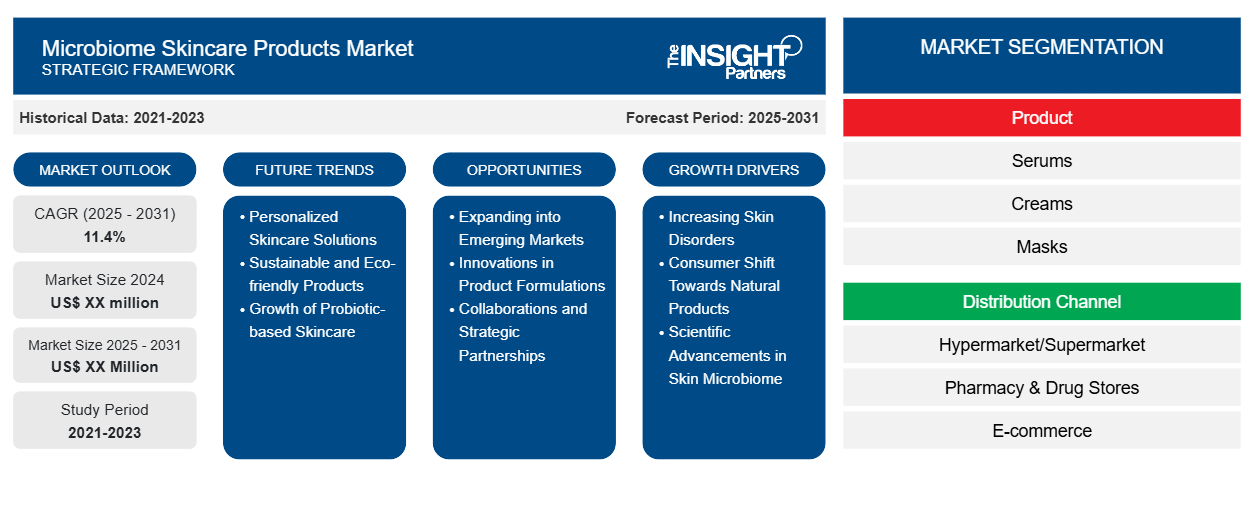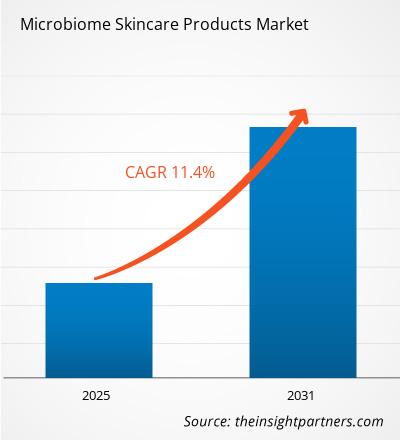The Microbiome Skincare Products Market is expected to register a CAGR of 11.4% from 2025 to 2031, with a market size expanding from US$ XX million in 2024 to US$ XX Million by 2031.
The report is segmented by Product (Serums, Creams, and Masks), Distribution Channel (Hypermarket/Supermarket, Pharmacy & Drug Stores, E-commerce, and Others)
Purpose of the Report
The report Microbiome Skincare Products Market by The Insight Partners aims to describe the present landscape and future growth, top driving factors, challenges, and opportunities. This will provide insights to various business stakeholders, such as:
- Technology Providers/Manufacturers: To understand the evolving market dynamics and know the potential growth opportunities, enabling them to make informed strategic decisions.
- Investors: To conduct a comprehensive trend analysis regarding the market growth rate, market financial projections, and opportunities that exist across the value chain.
- Regulatory bodies: To regulate policies and police activities in the market with the aim of minimizing abuse, preserving investor trust and confidence, and upholding the integrity and stability of the market.
Microbiome Skincare Products Market Segmentation
Product
- Serums
- Creams
- Masks
Distribution Channel
- Hypermarket/Supermarket
- Pharmacy & Drug Stores
- E-commerce
Customize This Report To Suit Your Requirement
Get FREE CUSTOMIZATIONMicrobiome Skincare Products Market: Strategic Insights

-
Get Top Key Market Trends of this report.This FREE sample will include data analysis, ranging from market trends to estimates and forecasts.
Microbiome Skincare Products Market Growth Drivers
- Increasing Skin Disorders: The rise in skin conditions such as acne, eczema, and rosacea has led to growing consumer interest in microbiome skincare products. These products help balance the skin's microbiota, which can improve skin health and reduce inflammation, boosting market demand as consumers seek effective and natural skincare solutions.
- Consumer Shift Towards Natural Products: There is a growing preference for natural and organic skincare products as consumers become more conscious about the ingredients in their beauty regimes. Microbiome skincare products, often marketed as clean and free from harmful chemicals, cater to this trend, fueling market growth.
- Scientific Advancements in Skin Microbiome: Ongoing research on the skin microbiome and its role in skin health has led to a greater understanding of how it impacts conditions like acne, aging, and sensitivity. This scientific validation is driving the adoption of microbiome-based skincare products, as consumers seek evidence-backed solutions for healthier skin.
Microbiome Skincare Products Market Future Trends
- Personalized Skincare Solutions: With the rise of personalized skincare, microbiome skincare products are increasingly tailored to individual skin types and concerns. These products use advanced technologies to analyze skin microbiomes, providing customized skincare solutions, which is becoming a significant trend in the beauty industry.
- Sustainable and Eco-friendly Products: Consumers are demanding more eco-friendly and sustainable skincare options. Microbiome skincare brands are responding by focusing on sustainable packaging, cruelty-free testing, and using natural ingredients. This trend aligns with growing environmental concerns and consumer desire to make ethical purchasing decisions.
- Growth of Probiotic-based Skincare: Probiotic-based skincare products are gaining popularity due to their ability to promote the growth of beneficial skin bacteria. These products support the skin’s microbiome, improving skin health by restoring its natural balance. As probiotics continue to trend, their incorporation into skincare is shaping the market’s future.
Microbiome Skincare Products Market Opportunities
- Expanding into Emerging Markets: The demand for skincare products is growing rapidly in emerging markets such as Asia-Pacific and Latin America. As consumer awareness of skin health and microbiome-based products increases, there is a significant opportunity for brands to enter these markets and capitalize on the growing interest in skincare solutions.
- Innovations in Product Formulations: Ongoing advancements in product formulations, such as combining microbiome-friendly ingredients with anti-aging or anti-inflammatory properties, present significant opportunities. Brands that develop new and improved microbiome skincare solutions to address a variety of skin concerns will likely gain a competitive edge in the market.
- Collaborations and Strategic Partnerships: Collaborations between microbiome skincare companies and dermatologists or research institutions are opportunities for product innovation and market expansion. By leveraging scientific expertise, these partnerships can lead to the creation of advanced, clinically proven microbiome-based skincare products, driving growth in the sector.
Microbiome Skincare Products Market Report Scope
| Report Attribute | Details |
|---|---|
| Market size in 2024 | US$ XX million |
| Market Size by 2031 | US$ XX Million |
| Global CAGR (2025 - 2031) | 11.4% |
| Historical Data | 2021-2023 |
| Forecast period | 2025-2031 |
| Segments Covered |
By Product
|
| Regions and Countries Covered |
North America
|
| Market leaders and key company profiles |
|
Microbiome Skincare Products Market Players Density: Understanding Its Impact on Business Dynamics
The Microbiome Skincare Products Market is growing rapidly, driven by increasing end-user demand due to factors such as evolving consumer preferences, technological advancements, and greater awareness of the product's benefits. As demand rises, businesses are expanding their offerings, innovating to meet consumer needs, and capitalizing on emerging trends, which further fuels market growth.

Key Selling Points
- Comprehensive Coverage: The report comprehensively covers the analysis of products, services, types, and end users of the Microbiome Skincare Products Market, providing a holistic landscape.
- Expert Analysis: The report is compiled based on the in-depth understanding of industry experts and analysts.
- Up-to-date Information: The report assures business relevance due to its coverage of recent information and data trends.
- Customization Options: This report can be customized to cater to specific client requirements and suit the business strategies aptly.
The research report on the Microbiome Skincare Products Market can, therefore, help spearhead the trail of decoding and understanding the industry scenario and growth prospects. Although there can be a few valid concerns, the overall benefits of this report tend to outweigh the disadvantages.
Frequently Asked Questions
- Historical Analysis (2 Years), Base Year, Forecast (7 Years) with CAGR
- PEST and SWOT Analysis
- Market Size Value / Volume - Global, Regional, Country
- Industry and Competitive Landscape
- Excel Dataset
Recent Reports
Testimonials
Reason to Buy
- Informed Decision-Making
- Understanding Market Dynamics
- Competitive Analysis
- Identifying Emerging Markets
- Customer Insights
- Market Forecasts
- Risk Mitigation
- Boosting Operational Efficiency
- Strategic Planning
- Investment Justification
- Tracking Industry Innovations
- Aligning with Regulatory Trends







 Get Free Sample For
Get Free Sample For